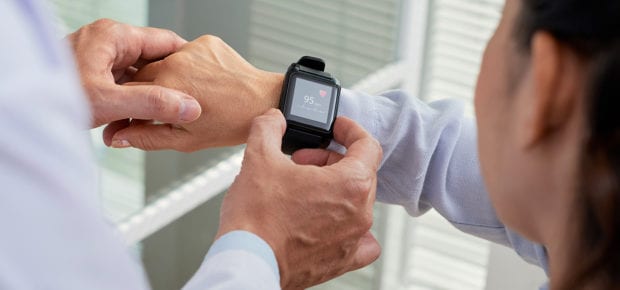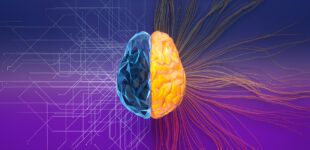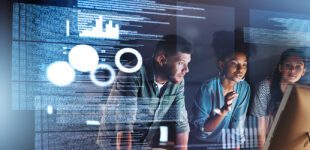July 11, 2018
For the last few years, “health wearables” have often been synonymous with step counters. Recently, advanced features like heart rate, calories burned, blood oxygen level and sleep monitoring have started appearing in more affordable consumer devices. But with new developments in AI, wearables stand to do way more in terms of tracking your holistic health, and alerting you to changes in it.
Here’s one example: by measuring skin conductance, a new wrist-worn sensor can detect when the wearer is having a seizure and call for help. It’s the first piece of consumer technology for a neurological condition approved by U.S. regulators.
Outside the realm of consumer technology, today’s medical wearables are starting to do some amazing things. “They can obtain high-resolution ECG measurements (including heart rate and detailed ECG morphology), respiratory function, thoracic impedance, skin temperature, galvanic skin response and three axis acceleration, all using a single, small and easy-to-wear device,” says Shervin Shirmohammadi, IEEE Fellow and Professor in the School of Electrical Engineering and Computer Science at the University of Ottawa.
These insights can be extremely useful to medical professionals. We often associate heart rate data from wearables with exercise, yet studies have shown it can also be used to track the severity of bipolar disorder and schizophrenia. Wearables can expand doctors’ access to data far beyond what they can get during a patient visit, enabling them to make better diagnoses and recommendations.
Though each of these data points can be useful to doctors, “Coupled with AI, these measurements will allow automatic detection of many problems and diseases, increasing the quality of personal healthcare,” says Shirmohammadi.
This level of personal data does raise a number of concerns, the first of which is privacy.
IEEE has an Industry Connections program focused on the issue. It works to provide the potential to identify ourselves online in a way that protects our privacy and our right to be forgotten. Working with technologists, academics and industry executives, the program builds frameworks that facilitate digital inclusion, trust, personal data agency and security for all.
Another concern is the accuracy of these devices, and their ability to learn using unstructured data. “Healthcare is a difficult domain for AI, because of the low levels of data integrity and disparate information technology systems used” says Kevin Curran, IEEE Senior member and Professor of Cybersecurity at Ulster University. While much of machine learning is done with curated data sets, expanding the ability to learn from rougher data is a focus for many researchers.
Along with the development of additional inputs like visual and chemical analyses, the world of AI wearables stands to change drastically over the next few years. To learn more about the role of AI in healthcare, and how Millennial parents around the world see it impacting the lives of their children, read our 2018 study on Generation AI.






 Meaningful Momentum or Running in Place?
Meaningful Momentum or Running in Place? AI Through Our Ages
AI Through Our Ages Liquid Infrastructure: Our Planet's Most Precious Resource
Liquid Infrastructure: Our Planet's Most Precious Resource The Impact of Technology in 2025
The Impact of Technology in 2025 Quantum and AI: Safeguards or Threats to Cybersecurity?
Quantum and AI: Safeguards or Threats to Cybersecurity? Why AI Can't Live Without Us
Why AI Can't Live Without Us Bits, Bytes, Buildings and Bridges: Digital-Driven Infrastructure
Bits, Bytes, Buildings and Bridges: Digital-Driven Infrastructure Impact of Technology in 2024
Impact of Technology in 2024 Emerging AI Cybersecurity Challenges and Solutions
Emerging AI Cybersecurity Challenges and Solutions The Skies are Unlimited
The Skies are Unlimited Smart Cities 2030: How Tech is Reshaping Urbanscapes
Smart Cities 2030: How Tech is Reshaping Urbanscapes Impact of Technology 2023
Impact of Technology 2023 Cybersecurity for Life-Changing Innovations
Cybersecurity for Life-Changing Innovations Smarter Wearables Healthier Life
Smarter Wearables Healthier Life Infrastructure In Motion
Infrastructure In Motion The Impact of Tech in 2022 and Beyond
The Impact of Tech in 2022 and Beyond Cybersecurity, Technology and Protecting Our World
Cybersecurity, Technology and Protecting Our World How Technology Helps us Understand Our Health and Wellness
How Technology Helps us Understand Our Health and Wellness The Resilience of Humanity
The Resilience of Humanity Harnessing and Sustaining our Natural Resources
Harnessing and Sustaining our Natural Resources Creating Healthy Spaces Through Technology
Creating Healthy Spaces Through Technology Exceptional Infrastructure Challenges, Technology and Humanity
Exceptional Infrastructure Challenges, Technology and Humanity The Global Impact of IEEE's 802 Standards
The Global Impact of IEEE's 802 Standards Scenes of our Cyber Lives: The Security Threats and Technology Solutions Protecting Us
Scenes of our Cyber Lives: The Security Threats and Technology Solutions Protecting Us How Millennial Parents are Embracing Health and Wellness Technologies for Their Generation Alpha Kids
How Millennial Parents are Embracing Health and Wellness Technologies for Their Generation Alpha Kids Space Exploration, Technology and Our Lives
Space Exploration, Technology and Our Lives Global Innovation and the Environment
Global Innovation and the Environment How Technology, Privacy and Security are Changing Each Other (And Us)
How Technology, Privacy and Security are Changing Each Other (And Us) Find us in booth 31506, LVCC South Hall 3 and experience the Technology Moon Walk
Find us in booth 31506, LVCC South Hall 3 and experience the Technology Moon Walk Virtual and Mixed Reality
Virtual and Mixed Reality How Robots are Improving our Health
How Robots are Improving our Health IEEE Experts and the Robots They are Teaching
IEEE Experts and the Robots They are Teaching See how millennial parents around the world see AI impacting the lives of their tech-infused offspring
See how millennial parents around the world see AI impacting the lives of their tech-infused offspring Take the journey from farm to table and learn how IoT will help us reach the rising demand for food production
Take the journey from farm to table and learn how IoT will help us reach the rising demand for food production Watch technical experts discuss the latest cyber threats
Watch technical experts discuss the latest cyber threats Explore how researchers, teachers, explorers, healthcare and medical professionals use immersive technologies
Explore how researchers, teachers, explorers, healthcare and medical professionals use immersive technologies Follow the timeline to see how Generation AI will be impacted by technology
Follow the timeline to see how Generation AI will be impacted by technology Learn how your IoT data can be used by experiencing a day in a connected life
Learn how your IoT data can be used by experiencing a day in a connected life Listen to technical experts discuss the biggest security threats today
Listen to technical experts discuss the biggest security threats today See how tech has influenced and evolved with the Games
See how tech has influenced and evolved with the Games Enter our virtual home to explore the IoT (Internet of Things) technologies
Enter our virtual home to explore the IoT (Internet of Things) technologies Explore an interactive map showcasing exciting innovations in robotics
Explore an interactive map showcasing exciting innovations in robotics Interactively explore A.I. in recent Hollywood movies
Interactively explore A.I. in recent Hollywood movies Get immersed in technologies that will improve patients' lives
Get immersed in technologies that will improve patients' lives